- Home
- Raymond Benson
The Black Stiletto Page 23
The Black Stiletto Read online
Page 23
It was difficult to catch my breath. All I wanted to do was nurse my shoulder, which was bleeding profusely. My left arm was useless.
“Ain’t your neighbors gonna call the cops, hearin’ a gunshot like that?” I asked.
He laughed. “My neighbors don’t give a shit about what other people do. Folks fire guns all the time around here. There’s a practice range out back of the trailer park. Now take off that mask. I want to see who was stupid enough to try and fuck with me.”
“I don’t think so.”
He aimed the gun lower. “The next shot goes in the leg. I’ll do it, too. Who the hell are you?”
Then I noticed how Douglas was standing. Legs apart. Directly over me. An image of Soichiro flashed in my mind and I heard his voice say, “You do know where the most vulnerable spot on a man is located?”
My leg catapulted toward his groin, but Douglas deflected the kick by swatting the gun against my leg so that I missed the vital area and ineffectually struck his left thigh. The pistol went off again, but the bullet missed me and penetrated the floor mere inches from my right hip.
Acting quickly, I used my other leg to kick him. I managed to strike him hard on the inside of his right knee, which caused him to buckle. Ignoring the excruciating pain in my shoulder, I performed a “kip-up,” in which you go from a supine position to a standing one by thrusting the legs upward and outward while pushing off the floor with the shoulders. With adequate back arching, you land on your feet. It requires a powerful hip extension, contracting the glutes and the back in one swift motion.
Once I was standing, I immediately disarmed Douglas by grabbing his gun arm, twisting around so my back was to him, and then chopping the forearm sharply with a shuto-uchi —knife-edge strike. He yelped and dropped the weapon. It bounced on the carpet and landed somewhere out of sight. I then elbowed him in the stomach, completing the succession of attacks that finally toppled him. Goliath fell hard, shaking the trailer home as if an earthquake had struck.
I spun around to continue the onslaught, but the man was devilishly fast. He rolled onto his side and managed to pick up the small coffee table by one leg, and then he flung it at me with great strength. The best I could do was to use my bad left arm as a shield against the impact, and it hurt like the dickens. I remember screaming in torment. The table dropped to the floor between us. By then, the monster was on his feet, ready for more. He lunged at me over the table, attempting a tackle at the waist. As soon as his heavy arms were around me, I focused on a karate vital point and used a knife-edge strike on the back of his neck right at the base of his skull. He jerked from the shock to his nerves and plummeted to the floor, but he still had some fight left. Douglas succeeded in grabbing my legs and felling me yet again! The interior space was just too constricting for me to maneuver properly; otherwise I could’ve easily avoided him. I crashed into the floor hard, effectively stunning me. Then the creep managed to take advantage of my condition and slug me in the stomach! He started to get to his feet so he could kick me, but I used his own weapon against him. I took hold of the coffee table and swung it at his legs with such force that the furniture shattered into three pieces. He dropped to his knees and actually landed on top of me before I could get up. His weight on my bad shoulder was agonizing. Then he got his hands around my throat and started to squeeze. His fingers were powerful and strong; they dug into my neck as if it was made of cotton. I couldn’t breathe! He was choking the life out of me!
I tried to break his hold, but my left arm was no good and my right wasn’t enough to do it alone.
Dear diary, I might’ve died right there on Douglas Bates’s floor. I felt my spirit ebbing away. A darkness enveloped my vision and my senses waned. And then, I swear I don’t know how it happened, but I had a vision—a vivid memory recall—of the night my stepfather raped me. I was thirteen years old. In my room. Douglas Bates, on top of me, ripping my insides, making me bleed, causing me intense pain...
This man had to pay for what he did!
So I did the only thing I could think of, essentially a last resort. To execute a deadly nihon nukite —a two-finger attack, I formed my hand like an imaginary gun, with the index and middle fingers straight and together like two sharp spears. Then I jabbed Douglas at the base of the throat in the fleshy vital point below his Adam’s apple as hard as I could.
It crushed his windpipe.
Now helpless, gasping for oxygen, he released me and rolled off. I inhaled precious air and moved away from him across the carpet until I was sitting with my back against the television. The man pleaded with his eyes for me to do something.
“No, Douglas, I’m not gonna help you,” I said. “You beat your wife and your stepkids. You poked out Frank’s eye. You caused your wife such intense unhappiness that manifested itself into a cancer that killed her. And you had the audacity to leave her as she was dyin’. But most of all, I’m not helpin’ you for what you did to me.”
I reached up and pulled off my mask and hood.
As he lay there, choking and gurgling, the horror of recognition spread over his face.
“That’s right, Douglas,” I said. “I’m Judy. And you’re dead.”
It took nearly three minutes. When he was finally still and lifeless, I weakly got to my feet. Blood covered my jacket and pants. I didn’t know how much I’d lost, but I needed medical attention or I would end up like the sorry son of a bitch on the floor. I had the presence of mind to take a look around to make sure I didn’t leave anything behind. All I saw was Douglas’s handgun on the bloody carpet. I ignored it.
I left the trailer and limped to the park entrance. I had no idea how long it would be before Luis picked me up. It seemed to be an eternity, but it was probably only a few minutes. The taxicab rolled by and stopped. I got in the backseat and said, “Luis, I’ve been shot.”
Then I passed out.
Sunlight from a window woke me up the next morning. My head was in a cloud and I felt terribly sleepy. At first I was frightened, for I didn’t know where I was. It was a child’s bedroom. The wallpaper had flowers and gingerbread men all over it. There were dolls and toys on the floor, pushed out of the way. The door was closed, but not all the way. I felt a dull ache in my shoulder and saw that my arm was in a sling and my gunshot wound was bandaged. I think I moaned loudly to see if anyone could hear me.
A Mexican woman came into the room. She approached me cautiously and spoke to me in Spanish. I couldn’t understand her. She had a glass of water for me, which I gulped greedily. Then Luis entered. He explained in broken English that I was at his house in south Odessa, and the woman was Juanita, his wife.
“What happened?” I asked him.
He said he took me to a doctor who was a friend of his. Not a hospital. It was someone who helped illegal immigrants from Mexico if they needed medical attention. Apparently the doctor removed the bullet and patched me up. I’d lost a lot of blood. I needed to rest and recover. I figured they must’ve drugged me in order to perform the operation. I didn’t remember a thing.
I was too groggy and confused to care, so I went back to sleep.
My stay with Luis and his family—three daughters along with his wife—lasted four days. He had taken care of checking me out of the motel and paying my bill, for which I repaid him. He also showed me the newspapers. Douglas Bates had been found dead in his trailer home, the victim of an unknown assailant. Police had no clues, except that witnesses of a bar fight in Goldsmith had claimed a “woman impersonating the Black Stiletto” may have been responsible. Then he showed me a copy of Time magazine, the existence of which I was unaware. One of those photos taken of the Black Stiletto in that bar in New York was on the cover. Luis pointed at it and then to me and asked a question in Spanish. I understood him.
“Yeah, that’s me.”
Luis swore to me that he and his wife would never speak of it. Again, the gesture of zipping his lips. We both laughed.
I flew back to New York a little over a week from the time I arriv
ed in Texas. I gave Luis not only the promised fifty dollars, but another fifty for his trouble. I think that one hundred fifty dollars was more money than he and his family had ever seen at one time. As for keeping silent, I trusted him. Luis and his wife were good people.
My arm’s still in a sling. Freddie fussed like a mother hen over it. Naturally, he pressed me for the story, but I wouldn’t tell him. All I said was I’d taken care of some important family business and the wound was simply part of the sacrifice. He asked if I’d settled the matter, and I replied, “Yes, I have.” Bless his heart, Freddie didn’t say anything more about it.
I wonder how long it’s going to be before the events in Odessa no longer occupy my dreams, for they are constant companions during the night. One thing is for sure—the image of Douglas choking to death on the floor of his trailer has now superseded the recurring nightmare of him raping me.
I honestly can’t say if that’s an improvement.
37
Martin
THE PRESENT
Almost done with the diary, but I had to leave the office and get to Woodlands to talk to my daughter. On the way over in the car, I got to thinking, and I gotta say something. My entire life has friggin’ changed. It’s as if everything I thought was true is not, and vice versa. My mother is not Judy Talbot, the single mom who stayed at home in the Chicago suburbs and looked after her son. No, she was really Judy Cooper, a vigilante, a living lethal weapon, a killer.
It’s not every son in the world who can say his mother is a murderer. Granted, she had compelling reasons to do what she did. The “law” aside, if Douglas Bates was really the monster my mom said he was, then personally I think he deserved what he got. I’m not sure what I think about the other deaths she was directly or indirectly responsible for—Vittorio Ranelli and Don Giorgio DeLuca. The jury’s still out on those.
I’m just going to have to read more of Mom’s diaries to learn more. There’s also the mystery of the other items I found. What’s with the JFK campaign button? The heart-shaped locket? The roll of film? The gold key? And what about that Smith & Wesson handgun that was in the secret closet?
And that brings up a whole different topic. It’s something I’ve wondered about for years. How did Mom support us? She didn’t work the entire time I lived with her. She never had a “job-job.” I remember a few times, as I was growing up, when I’d ask her, “Mom, how come you don’t go to work?” And she’d say something like, “My job is to take care of you.” Then, when I was older, I asked practical questions like, “Mom, what do we live on? Where is the money coming from?” And she’d answer that my father left us an inheritance.
My father. Right. Who the hell was he? Will I ever find out? Did Richard Talbot really exist, or is he a fantasy created by my mother to placate me? Should I grill Uncle Thomas and find out more about her money? I can only hope the other diaries will reveal that answer.
Anyway, I now look at my mother in a totally different light. Can’t help it. I’ve been angry at her for the past few days, but I guess you can say I really have a renewed respect for her. Her bravery. The monumental achievement of escaping a horrible situation at home and creating a new identity. The way she trained herself and learned all those fighting techniques just so she could be the Black Stiletto. It’s beyond what any normal woman would do, especially in the fifties!
After reading through the first diary, though, I think I’m beginning to understand a little of why she did it. Every so often, a few individuals appear in this world that transcend us mere mortals and become something unique and important. The Olympic champions and famous athletes, or gifted actors or musicians—the kind that make money!—or charismatic government leaders. That’s Judy Cooper. She was one of those. Damn, it’s as if I’m meeting my mother—the real Judy Cooper—for the first time.
It’s made me want to visit her more often. I won’t bring up the past anymore. It upsets her, and I don’t think she even knows why. But there are indeed memories locked up in her brain somewhere, and every now and then a word or name or place triggers a response. Her doctor once explained the disease as a wall around a person’s memories, and the brain simply can’t get to them. The mind knows the memories are there, but they can’t be seen, read, felt, touched, or heard. So when Mom feels an emotional response to something that’s a memory, she reacts with anger and frustration because she can’t get through or over that wall.
It was nearly dinner time at the nursing home when I arrived. Once again, I found Mom in the common room with other residents, blankly watching television. Gina was there with her.
“Hi, Dad.”
“I’ll talk to you in a minute,” I growled. “Hi, Mom.”
She said hello to me and then immediately went back to the show. A musical was on—My Fair Lady, I think. I couldn’t tell if Mom was enjoying it or not. She just stared at the picture without smiling, laughing, or even crying. I had to assume it gave her something to do.
“What’s wrong, Dad?” Gina asked.
“Now I know why you wanted to know about Grandma living in New York.”
My daughter’s mouth opened. “Did Mom tell you?”
“Yes, she did.”
“I can’t believe it!” She stood. “Look, I was gonna tell you.”
“Oh? When? I didn’t even know you’d applied to Juilliard.”
The nursing staff raised their heads. Our voices were obviously loud.
“Let’s talk about this later,” I said. “Stick around.”
The movie ended and one of the staff switched the television to the local news.
“Mom, you want to go into the dining room and eat?” I asked. The dining room was in the same direction as her room.
She nodded and said, “Okay.” I held out my arm for her to take it. She stood and we started to walk away—when I heard the announcer on the TV say, “We bring you this special bulletin—” I wasn’t paying much attention to it until I heard the words, “—the murder of a real estate agent at a home in Arlington Heights. Katherine Reynolds was found dead when a coworker went to the property—”
It was the realtor’s name that rang a bell. I knew her. In fact, she was the agent handling the sale of the old place on Chestnut. My head turned toward the TV and there was a shot of the exterior of our house!
“Hold on a second, Mom,” I said. We stopped walking and I focused on the news bulletin.
There was no question. It was the house, with yellow police tape and cop cars in front of it. Apparently it had happened recently. Like, in the past hour or two.
“Hey, that’s Grandma’s house,” Gina astutely observed.
Then the strangest thing occurred. My whole body started tingling. It was similar to the feeling you get when you have déjà vu. Or maybe it was more like an intense anxiety, a buzz that prompts you to act quickly.
Something was very wrong.
“Mom, I think we should get your sweater or jacket. Let’s go for a ride in the car. What do you say?”
“That’d be nice.”
“You haven’t been for a car ride in a while.”
“I haven’t?”
“Dad, what’s wrong?” Gina asked. I waved at her to shush up.
“Let’s go to your room and get something to put over you, Mom. It’s actually pretty nice outside, but you might get chilly.”
I didn’t know what was going on; I just knew I had to get my mom out of the nursing home. She was in great danger.
As we walked to her room, she kept her consistently slow pace no matter how much I tried to rush her. I had a feeling she could move faster if she really wanted. Her legs may have been thin, but there was still plenty of muscle there. Gina followed behind us.
“Dad, what’s going on? Is something the matter?”
We got to her room. I opened the closet and found a sweater.
“Here, let me help you put this on.”
As I did so, my mother said, “You are a nice man.”
“Thank yo
u, Mom. I’m your son, you know. You brought me up to be nice.”
That brought a smile to her face.
“Okay, let’s go. The car’s outside. Maybe we can go to McDonald’s for dinner. Would you like that?”
She nodded like a schoolgirl. I didn’t know if she remembered what McDonald’s was, but it must have sounded good.
Then Gina suddenly dropped into a chair, her eyes closed and her hand on her forehead.
“What’s wrong?” I asked her.
“I don’t know. I feel weird,” she said.
“Are you sick?”
“No. It’s like—I don’t know how to describe it. It’s like how I feel before a test or something. Kinda scared.”
I think I understood. I was feeling the same thing.
“Can you walk with us?”
“Yeah.”
She got up and we slowly moved into the hallway and headed back toward the common room. Mom held my arm as we walked, just like she always did. It was almost as if she was an elegant lady of royalty and I was her escort.
The Alzheimer unit’s common room lay between us and the doors leading to the rest of the facility. There was still another long hallway to the main entrance. Several residents, along with a couple of nurses and staff people, were still in the common room, slowly making their way to the dining room behind us.
Then I saw him.
An elderly man had come in the double doors and approached the desk. He looked a little shabby, wearing clothes that were slightly too big for him. The most striking thing about him was his demeanor: cold, calculating, and to the point.
“I’m lookin’ for Judy Talbot,” he said.
The nurse smiled and pointed our way. “Why, that’s her, right there!”
The man jerked his head toward us and narrowed his eyes.
Oh my God, it was Roberto Ranelli! It had to be!
I froze. I didn’t know what the hell I should do. Pick Mom up and run with her in my arms? Confront the guy and send him on his way?
He walked toward us and stopped just a few feet away. Ranelli looked at my mother, up and down, and snarled, “Yeah, it’s you, all right. I recognize you, you fuckin’ bitch!”

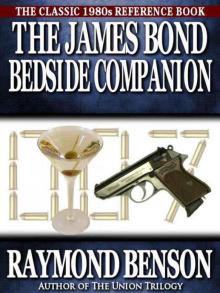 The James Bond Bedside Companion
The James Bond Bedside Companion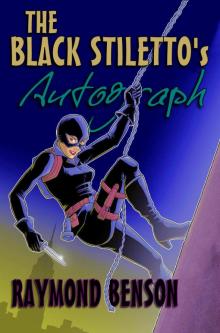 The Black Stiletto's Autograph
The Black Stiletto's Autograph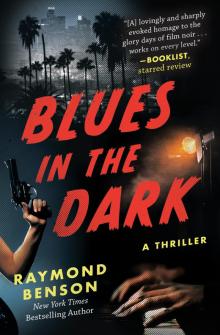 Blues in the Dark
Blues in the Dark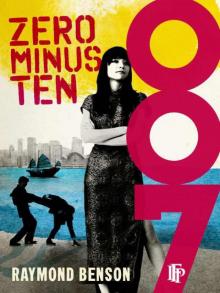 Zero Minus Ten
Zero Minus Ten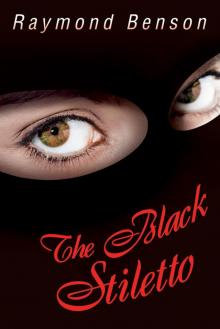 The Black Stiletto
The Black Stiletto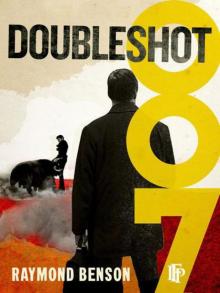 Doubleshot
Doubleshot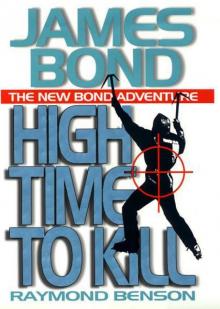 High Time To Kill rbb-3
High Time To Kill rbb-3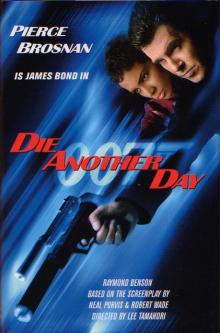 Bond Movies 07 - Die Another Day
Bond Movies 07 - Die Another Day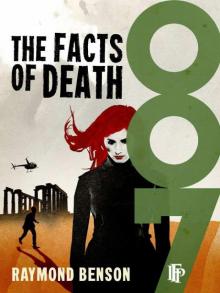 The Facts Of Death
The Facts Of Death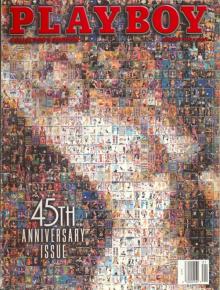 Midsummer Night's Doom
Midsummer Night's Doom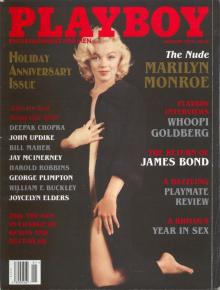 Blast from the Past
Blast from the Past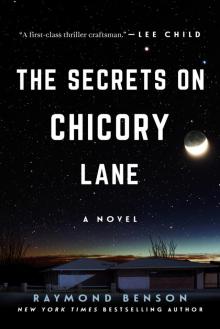 The Secrets on Chicory Lane
The Secrets on Chicory Lane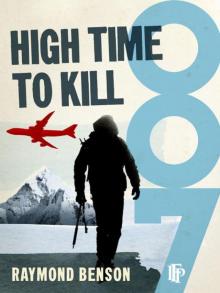 High Time To Kill
High Time To Kill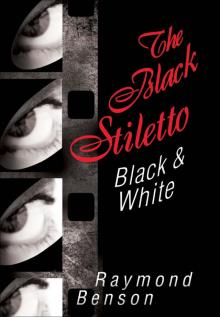 The Black Stiletto: Black & White
The Black Stiletto: Black & White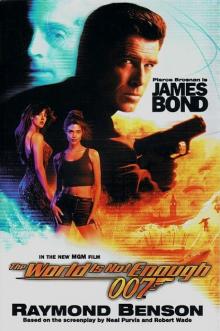 The World Is Not Enough jb-1
The World Is Not Enough jb-1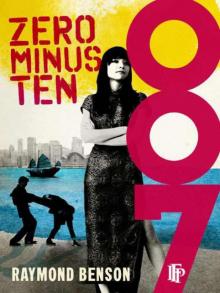 Zero Minus Ten rbb-1
Zero Minus Ten rbb-1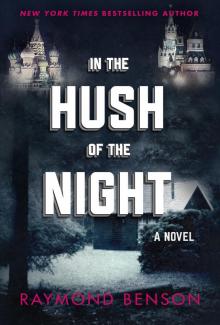 In the Hush of the Night
In the Hush of the Night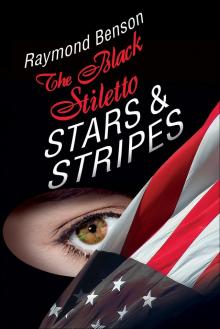 The Black Stiletto: Stars & Stripes
The Black Stiletto: Stars & Stripes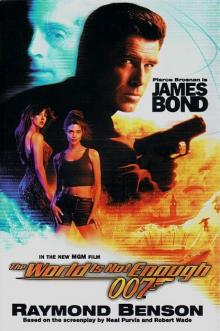 Bond Movies 06 - The World Is Not Enough
Bond Movies 06 - The World Is Not Enough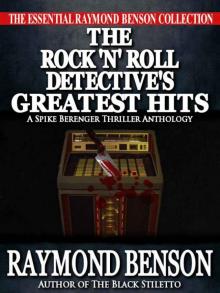 The Rock 'n Roll Detective's Greatest Hits - A Spike Berenger Anthology
The Rock 'n Roll Detective's Greatest Hits - A Spike Berenger Anthology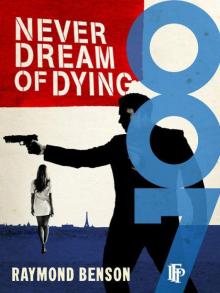 Never Dream Of Dying
Never Dream Of Dying